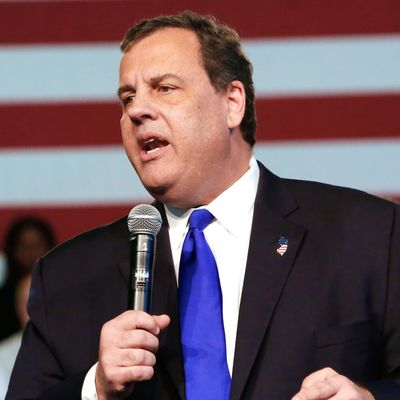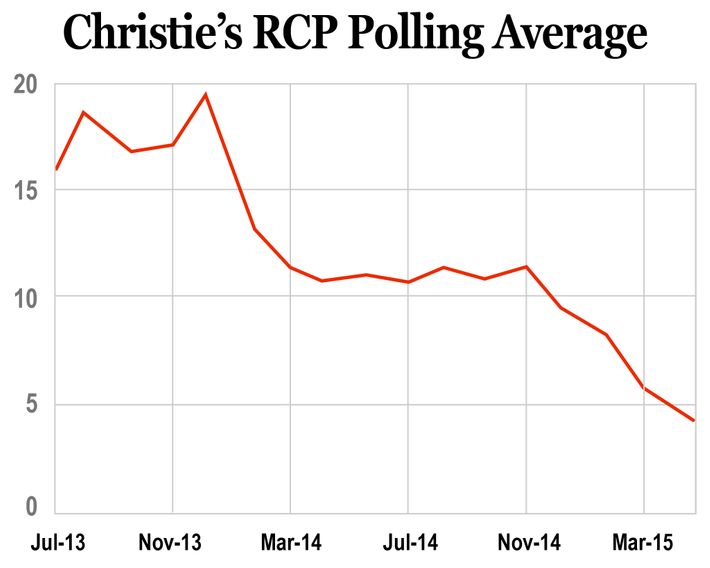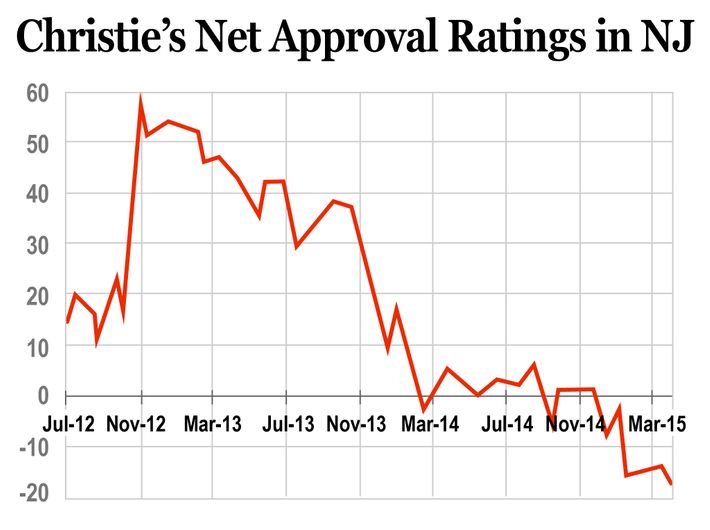
The last few years have been tough for Chris Christie, so it was perhaps fitting that he chose to announce his presidential campaign Tuesday from the high school where he served as class president for four years. “Everything started here for me,” he said to his hometown supporters, packed into his high school gym. “The confidence, the education, the friends, the family and the love that I always felt for and from this community, when I decided to make this announcement there wasn’t any choice. I had to come home.”
Christie shouted out the hard-working women in his life and told the story of his father being the first in his family to go to college. As he has so many times before, he pitched himself as the brave truth-teller who was ready to take on the political Establishment. “We must tell each other the truth about the problems we have and the difficulties of the solutions, but if we tell each other the truth, everybody, we recognize that truth and hard decisions today will lead to growth and opportunity for every American in this country.” He promised “a campaign without spin … whether you like it or not, or whether it makes you cringe every once and a while or not.” He explained his motivation for seeking higher office: “I wake up every morning knowing that I have the opportunity to do something great — that’s why this job is a great job and that’s why president of the United States is an even greater job for a greater number of people!”
It was an energetic if inauspicious start to his presidential campaign. Christie has the rare distinction of being the only presidential candidate so far this cycle to fall from front-runner status to the bottom of the second tier, all before even announcing his bid. He places ninth amid 15 GOP hopefuls, according to Real Clear Politics’ averaging of 2016 primary polls, sandwiched just ahead of Rick Perry and just behind Donald Trump. He is currently the choice of 4 percent of the surveyed GOP primary electorate — a precipitous drop from December 2013, when he led the field with 20 percent.

Christie built his entire political career on the premise of being an ass-kicking iconoclast: the U.S. Attorney who prosecuted more than 100 people for corruption, and later, the gubernatorial candidate who promised to clean up Trenton. In his first few years as governor he earned solid approval ratings (as high as 50 percent in 2012) and loads of national attention for his made-for-YouTube confrontations with hecklers, legislators, public-school teachers, anyone who asked for it — and even a few who didn’t. But those numbers have also fallen to 30 percent, “thanks to a combination of bad luck and personal hubris,” says GOP strategist Joe Brettell.

His sinking approval ratings are partly explained by the state’s financial situation — though Christie helped correct a multi-billion-dollar deficit he inherited from his Democratic predecessor, Jon Corzine, the state has still had its credit rating downgraded nine times under Christie’s governorship. It’s not entirely his fault — as one Corzine aide told New York Magazine in a 2010 profile of Christie, being governor of New Jersey “is a setup for failure. It’s a sucker’s bet” — but it did cost him, as did the slow progress in state efforts to rebuild some of the homes destroyed by Hurricane Sandy.
Still, none of this was enough to sink Christie. He was reelected in 2013 with 60 percent of the vote. As head of the Republican Governors Association, he was raising piles of cash, demonstrating to other Republicans how he’d clear the primary field. Then, the world learned of his office’s involvement in the traffic problems in Fort Lee. Bridgegate seemed the fatal blow to his core premise as a politician. In the year and a half since the scandal broke, Christie’s sworn up and down that he knew nothing about the plot. But a majority of New Jersey voters — people who’ve seen enough political scandal in their state to have a good reason to be cynical — don’t believe him. His numbers in the primary polls took a dive. While Christie insisted he was still making a decision, Jeb Bush was busy vacuuming up his potential donors. A key Christie ally, State Senator Joe Kyrillos, defected to Bush. But rather than look at the available evidence and conclude his time was over, Christie kept on — one of the only ones who didn’t see it that way.
Of course, Christie isn’t blind, and the shrunken scale of his campaign effort is a sign that he knows his place in the political landscape has shifted. Where once he seemed poised to compete in every primary, now his campaign seems to rest entirely on pulling out a long-shot win in New Hampshire, where he will go right after the speech and spend the rest of the week. The state should be friendly territory for a governor who relishes the town-hall experience just as much as the state’s voters demand it — except the Bridgegate scandal follows him there, too.
According to Politico, his campaign now plans to raise somewhere between $20 to $30 million by the end of this year — far less than some of his top-tier competitors, including Jeb Bush, who’s expected to announce a $100 million fund-raising haul next month.
And though the scandal undermined the central premise of Christie’s candidacy — that he’s the honest politician and the anti-corruption crusader — his campaign launch makes clear that Christie is still sticking with the idea that confrontational candor is the core argument for his campaign. On Sunday night, his campaign teased the announcement with a video called “Telling It Like It Is,” in which Christie explains the story behind his reputation for blunt talk. “I have an Irish father; I had a Sicilian mother,” he says, to a town-hall audience that responds with knowing laughs. Christie explains that his mother taught him that it was essential to be honest with the people who trust in him. “I know if my mom were still alive she’d say to me, ‘I taught you that in a trusting relationship, you don’t hold anything back. If you’re going to run for president of the United States and ask them for their vote that is the single most trusting thing they can do as a citizen, is to give you their support. So you better tell them exactly what you’re thinking and what you’re feeling,’” Christie says in the video.
But if straight talk is a core part of Christie’s political DNA, so is charging full speed when everyone’s telling him not to. Christie is not the first guy to join the race who’s become accustomed to thinking of himself as the underdog who overcame the odds. But he might be the most confident. Three years ago, everyone was clamoring for him to join the race. Christie insisted it wasn’t the right time. Now, coming toward the end of his second term in office, he clearly thinks the timing is right, and he is not going to let the polls or conventional wisdom change his thinking. “The fact that he’s well behind in the polls not where he wants to be, it doesn’t change his view of running one iota,” says Steve Adubato, a political analyst and author who once served in the New Jersey General Assembly as a Democrat.
It was all there in his announcement. “We have to stop worrying about being loved and start caring about being respected again, both at home and around the world. I am not running for President of the United States as a surrogate for being elected prom king of America. I’m not looking to be the most popular guy who looks in your eyes every day and tries to figure out what you want to hear,” he said to cheers. “I mean what I say and I say what I mean and that’s what America needs right now.” The question is whether anyone still agrees.





























